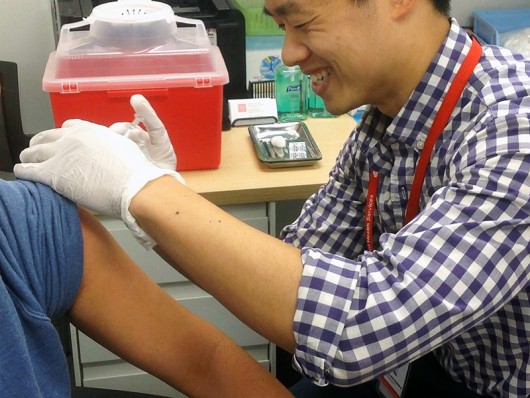
Student receives flu shot at Wilce Student Health Center. Credit: Jenna Leinasars / For The Lantern,
With this year’s flu season just around the corner, the Ohio State medical community is trying to prepare students to fight the illness and stay healthy.
The Wilce Student Health Center has ordered about 4,500 vaccines for students, said Jonda Hapner-Yengo, a certified nurse practitioner at the facility.
“When you’re looking at flu vaccine efficacy it can be anywhere from 60 percent to 90 percent efficacious in preventing the flu,” she said.
Hapner-Yengo said with college students sharing so many community spaces, it’s very easy to pick something up.
“Typically, what I see at Ohio State is after people come back from Thanksgiving break, they’re bringing all the germs from home,” she said. “And after that, it spreads like wildfire through the campus, if you aren’t immunized or taking precautions.”
Dr. Fred Miser, professor of family medicine and residency director of family medicine at the OSU Rardin Family Practice Center also added that living in closed spaces makes students more susceptible to the flu.
“Typically late hours, studying or playing hard, not sleeping well, that can dock your immune system down too,” Miser said.
Ian Branam, a health communication specialist for the Center for Disease Control and Prevention, said that flu vaccination rates among adults begin to rise in October and peak in November and December.
Branam said the CDC recommends everyone over the age of six months receive an annual flu vaccine.
Miser and Hapner-Yengo said the best way to prevent the flu is to receive the flu vaccination.
“The flu vaccine, when people get that, if they’re subsequently exposed to that virus, the body has already developed a defense system against it to kill off that virus before it takes hold of the individual,” Miser said.
Protection against H1N1, known as swine flu, is also incorporated into the vaccine. The illness affects young and healthy people, making it even more important for college students to receive a flu vaccine, Hapner-Yengo said.
However, flu prevention is less effective if it is only an individual responsibility rather than community responsibility. “Herd immunity” relies on the idea that if more and more people become vaccinated, the less likely it is for outbreaks, Miser said.
Both Hapner-Yengo and Miser’s facilities are offering opportunities for students to get vaccinated for the upcoming flu season.
The Wilce Student Health Center offers walk-in flu clinics and scheduled immunization appointments. The Rardin Family Practice offers flu vaccinations by call-ahead appointment.
Miser and Hapner-Yengo also advised additional methods for students to protect themselves.
Miser said staying away from others who have the flu and good hand washing are key, while Hapner-Yengo said she recommended using hand sanitizer and covering a cough to limit the spread of germs.
Hapner-Yengo and Miser both said that catching the flu could result in at least a week of missed classes, and with midterms quickly approaching, extended absences are not something any Buckeye can afford.


